七年级第10期英语周报(GZ)答案解析
七年级期中英语周报(GZ)答案解析
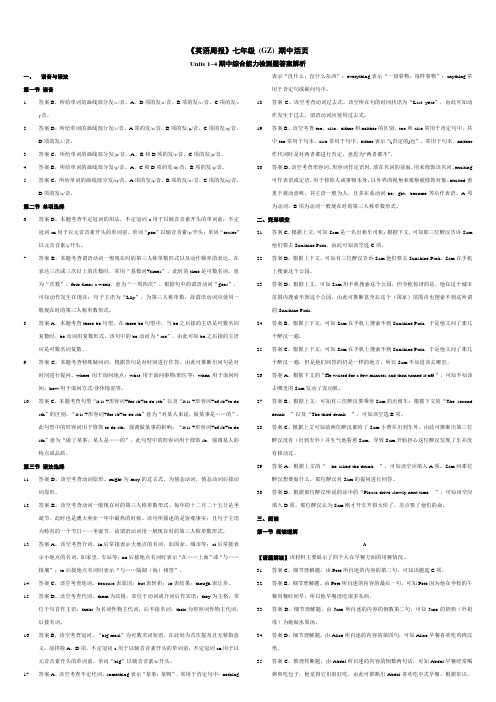
《英语周报》七年级(GZ) 期中活页Units 1~4期中综合能力检测题答案解析一、语音与语法第一节语音1.答案B。
所给单词的画线部分发/ɔː/音。
A、D项的发/ɒ/音,B项的发/ɔː/音,C项的发/ɔɪ/音。
2.答案D。
所给单词的画线部分发/iː/音。
A项的发/e/音,B项的发/ɪə/音,C项的发/eɪ/音,D项的发/iː/音。
3.答案C。
所给单词的画线部分发/ɪz/音。
A、B和D项的发/z/音,C项的发/ɪz/音。
4.答案B。
所给单词的画线部分发/g/音。
A、C和D项的发/dʒ/音,B项的发/g/音。
5.答案C。
所给单词的画线部分发/eɪ/音。
A项的发/ə/音,B项的发/ɑː/音,C项的发/eɪ/音,D项的发/e/音。
第二节单项选择6.答案D。
本题考查不定冠词的用法。
不定冠词a用于以辅音音素开头的单词前;不定冠词an用于以元音音素开头的单词前。
单词“pen”以辅音音素/p/开头;单词“eraser”以元音音素/ɪ/开头。
7.答案B。
本题考查谓语动词一般现在时的第三人称单数形式以及动作频率的表达。
在表达三次或三次以上的次数时,常用“基数词+times”,此时的time是可数名词,意为“次数”。
four times a week,意为“一周四次”。
根据句中的谓语动词“goes”,可知动作发生在现在;句子主语为“Lily”,为第三人称单数,故谓语动词应使用一般现在时的第三人称单数形式。
8.答案A。
本题考查there be句型。
在there be句型中,当be之后接的主语是可数名词复数时,be动词用复数形式。
该句中的be动词为“are”,由此可知be之后接的主语应是可数名词复数。
9.答案C。
本题考查特殊疑问词。
根据答句是对时间进行作答,由此可推断出问句是对时间进行提问。
where用于询问地点;what用于询问事物/职位等;when用于询问时间;how用于询问方式/身体情况等。
10.答案C。
本题考查句型“it is +形容词+for sb+to do sth”以及“it is +形容词+of sb+to dosth”的区别。
七年级第17期英语周报(GZ)答案解析
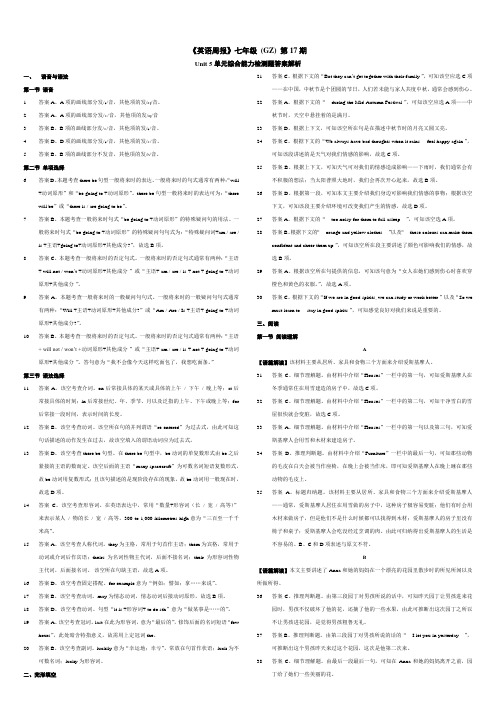
《英语周报》七年级(GZ) 第17期Unit 5单元综合能力检测题答案解析一、语音与语法第一节语音1.答案A。
A项的画线部分发/ə/音,其他项的发/eɪ/音。
2.答案A。
A项的画线部分发/ɜː/音,其他项的发/eɪ/音3.答案B。
B项的画线部分发/ɜː/音,其他项的发/ə/音。
4.答案D。
D项的画线部分发/ə/音,其他项的发/ɜː/音。
5.答案B。
B项的画线部分不发音,其他项的发/h/音。
第二节单项选择6.答案D。
本题考查there be句型一般将来时的表达。
一般将来时的句式通常有两种:“will+动词原形”和“be going to +动词原形”。
there be句型一般将来时的表达可为:“there will be”或“there is / are going to be”。
7.答案B。
本题考查一般将来时句式“be going to +动词原形”的特殊疑问句的用法。
一般将来时句式“be going to +动词原形”的特殊疑问句句式为:“特殊疑问词+am / are / is +主语+going to+动词原形+其他成分?”,故选B项。
8.答案C。
本题考查一般将来时的否定句式。
一般将来时的否定句式通常有两种:“主语+ will not / won’t +动词原形+其他成分.”或“主语+ am / are / is + not + going to +动词原形+其他成分.”。
9.答案A。
本题考查一般将来时的一般疑问句句式。
一般将来时的一般疑问句句式通常有两种:“Will +主语+动词原形+其他成分?”或“Am / Are / Is +主语+ going to +动词原形+其他成分?”。
10.答案B。
本题考查一般将来时的否定句式。
一般将来时的否定句式通常有两种:“主语+ will not / won’t +动词原形+其他成分.”或“主语+ am / are / is + not + going to +动词原形+其他成分.”。
英语周报七年级牛津(SZY)第10期

第三版 语言知识部分
( B ) 6. — The land is ______.
— We can’ t grow any plants here.
A. rich B. dry C. flat ( C) 7.— Do you have any______abroad? — Yes. My aunt lives in New Zealand. A. friends C. relatives B. neighbours
A. jump第三版 语言知识部分
( C ) 3. If you
something, you hit it with your foot. A. touch B. hold C. kick
第三版 语言知识部分
B. 根据句意, 选择最恰当的词或短语填空。 ( A ) 4. — I think the cat went this way. Look,here are its______. — Follow them and we can find it. A. footprints B. letters C. messages ( C) 5. — It’ s ______today. — How thick the snow on the ground is! A. rainy B. windy C. snowy
第三版 语言知识部分
( B )10 . — What did you do in the winter
holiday? — I took a trip to Suzhou with my parents. A. went fishing B. went travelling C. went skating
第三版 语言知识部分
学生双语报2013-2014上学年七年级配合外研新标准版佛山专版第10期测试题答案
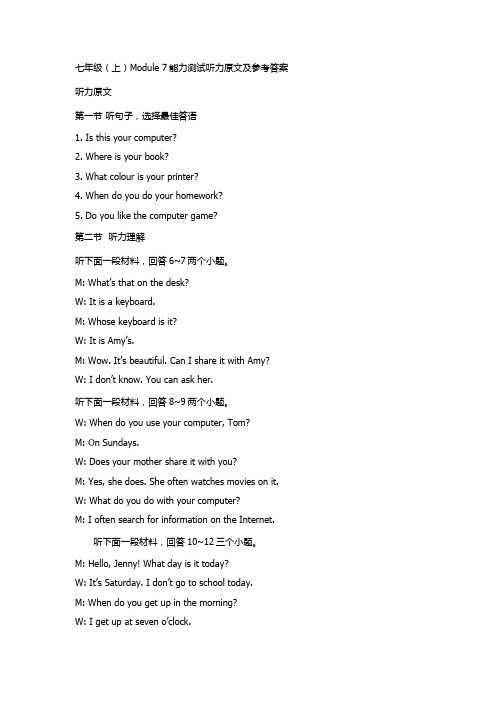
七年级(上)Module 7能力测试听力原文及参考答案听力原文第一节听句子,选择最佳答语1. Is this your computer?2. Where is your book?3. What colour is your printer?4. When do you do your homework?5. Do you like the computer game?第二节听力理解听下面一段材料,回答6~7两个小题。
M: What’s that on the des k?W: It is a keyboard.M: Whose keyboard is it?W: It is Amy’s.M: Wow. It’s beautiful. Can I share it with Amy? W: I don’t know. You can ask her.听下面一段材料,回答8~9两个小题。
W: When do you use your computer, Tom?M: On Sundays.W: Does your mother share it with you?M: Yes, she does. She often watches movies on it. W: What do you do with your computer?M: I often search for information on the Internet.听下面一段材料,回答10~12三个小题。
M: Hello, Jenny! What day is it today?W: It’s Saturday. I don’t go to sch ool today.M: When do you get up in the morning?W: I get up at seven o’clock.M: What do you do in the morning?W: After breakfast, I do some reading, and then I do my homework.M: Do you do the homework on the computer?W: Yes, I do.听下面一段材料,回答13~15三个小题。
英语周报七年级(GZ)第3期答案解析
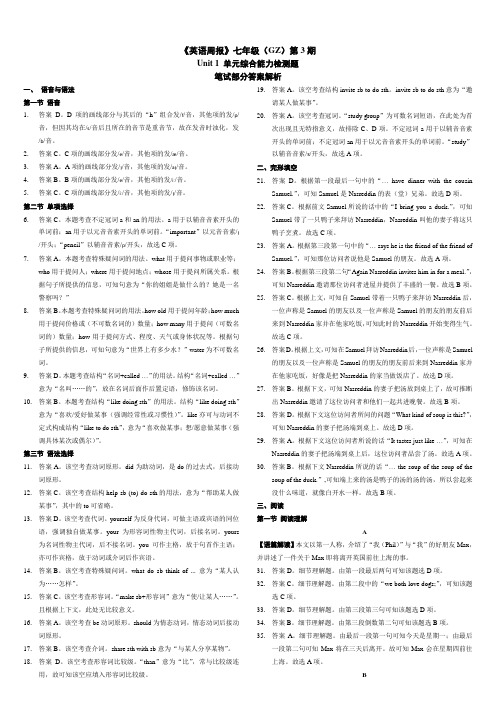
《英语周报》七年级(GZ)第3期Unit 1 单元综合能力检测题笔试部分答案解析一、语音与语法第一节语音1.答案D。
D项的画线部分与其后的“h”组合发/f/音,其他项的发/p/音,但因其均在/s/音后且所在的音节是重音节,故在发音时浊化,发/b/音。
2.答案C。
C项的画线部分发/e/音,其他项的发/æ/音。
3.答案A。
A项的画线部分发/ɪ/音,其他项的发/aɪ/音。
4.答案B。
B项的画线部分发/e/音,其他项的发/iː/音。
5.答案C。
C项的画线部分发/iː/音,其他项的发/ɪ/音。
第二节单项选择6.答案C。
本题考查不定冠词a和an的用法。
a用于以辅音音素开头的单词前;an用于以元音音素开头的单词前。
“important”以元音音素/ɪ/开头;“pencil”以辅音音素/p/开头,故选C项。
7.答案A。
本题考查特殊疑问词的用法。
what用于提问事物或职业等;who用于提问人;where用于提问地点;whose用于提问所属关系。
根据句子所提供的信息,可知句意为“你的姐姐是做什么的?她是一名警察吗?”8.答案B。
本题考查特殊疑问词的用法。
how old用于提问年龄;how much用于提问价格或(不可数名词的)数量;how many用于提问(可数名词的)数量;how用于提问方式、程度、天气或身体状况等。
根据句子所提供的信息,可知句意为“世界上有多少水?”water为不可数名词。
9.答案D。
本题考查结构“名词+called …”的用法。
结构“名词+called …”意为“名叫……的”,放在名词后面作后置定语,修饰该名词。
10.答案B。
本题考查结构“like doing sth”的用法。
结构“like doing sth”意为“喜欢/爱好做某事(强调经常性或习惯性)”。
like亦可与动词不定式构成结构“like to do sth”,意为“喜欢做某事;想/愿意做某事(强调具体某次或偶尔)”。
第三节语法选择11.答案A。
英语周报六年级(GZ)综合复习14-15下参考答案

英语周报六年级(GZ)综合复习14-15学年下参考答案第3 版语音一、1-5 BACDA 6-10 BDBDC 11-15 BCDAC二、1-5 ABCDC 6-10 BDACB 11-15 DADAB三、1-5 (3)(2)(3)(4)(2)6-10(1)(4)(2)(2)(2)11-15 (3)(4)(2)(2)(2)四、1-5 DCABD 6-10 ADBCA 11-15 CBABD第4 版词汇(一)一、1-6 CDBABA 7-12 ACDCBD二、1-4 CBBA 5-8 CBCA三、1. played, basketball 2. fell, bike 3. eating, mooncakes 4. puts, gifts5. painter, flowers6. quiet, library7. in, line8. throwing, ground四、1. pick, from, if 2. milks, the, cow 3. slow, crowded4. all, day, long; was, at, all5. take, a, rest6. watching, cartoons; write, stories7. Remember, race 8. Suddenly, crashed, into 9. looks, like, in, the, ocean / sea10. save, in, danger 11. stop, polluting 12. From, then, on13. important, Chinese, history 14. polite, in, need15. Paris, great / good, place 16. famous, for, natural, beauty第5 版词汇(二)一、1. longer, longest 2. bigger, biggest 3. hotter, hottest4. happier, happiest5. whiter, whitest6. sunnier, sunniest7. more beautiful, most beautiful 8. more important, most important9. worse, worst 10. better, best二、1-5 CBDCD 6-10 BAABD三、1. at, the, top 2. going, boating 3. helping, with4. listening, radio5. wakes, quarter6. plays, computer, games7. hands, homework 8. has, bath四、1. went, to, cinema 2. goes, shopping 3. by, plane, Saturday4. should, more, fruit5. go, for, walk6. have, lunch7. leave, for 8. playing, basketball 9. What, colour 10. wants, be, scientist第6 版句型、语法(一)一、1-5 ABCAC二、1-5 BCBAC 6-10 ACBAC三、1. cutting, to feed 2. cows, sheep 3. takes, minutes 4. pupils5. so many6. worries, has, his7. Reading, writing8. me, writer9. became, was 10. help, to get四、mouse, eating, catch, Don’t, teeth, freed,brush, eat第7 版句型、语法(二)一、1. Does, clean, goes; does 2. Do, help; don’t, do 3. does, come; comes4. did, go; went5. Will, visit; won’t6. called, weren’t, were; planted7. Did, speak; spoke 8. Was; stayed二、1-5 CCAAB 6-10 BCBAB三、1. B dance → danced 2. B mine → my 3. A hundreds→hundred4. A for → at5. B breads→bread6. A a → an7. B bigger → bigg est 8. C goose → geese9. C student → students10. A Whose → Who’s第8 版功能用语一、1-4 DAFC 5-8 EHGB二、Excuse, Can, do, have, here, By, long,welcome三、(I) Can, like, about, much, take, Thank(II) Did, yet, OK, right四、1. I’m eleven. / ...2. She was born in 1975. / ...3. By underground. / ...4. I want to be a singer when I grow up./ ...5. Forty. / ...6. My father. / ...7. Yes, I did. / No, I didn’t.8. Yes, I can. / No, I can’t.9. It’s sixty yuan. / ...10. I’m going shopping in Beijing Road with my mother. / ...第9 版阅读理解(一)(A)1. She can’t find her son.2. He has a round face, big brown eyes and brown hair.3. Yes, he can.4. He is in the police office.5. He likes eating chocolate.(B)1-5 FTFFT(C)1-5 CACBB第10 版阅读理解(二)(D)1-5 FTTFT(E)1-5 CCABA(F)1. Clark Kent 2. Black 3. Blue 4. Journalist 5. Lois Lane6. red, yellow第11 版写作(I)My favourite festival is the Spring Festival. Before the festival my parents and I usually clean our house and go shopping. We also go to the flower fair to buy some beautiful flowers. On the eve of the Spring Festival we usually have a big meal. During the Spring Festival we often visit our relatives and friends. I usually get a lot of lucky money. And during the Spring Festival I always have a good time.(II)It was May 12th. It was Sunday. All the people in Lily’s family were at home. Lily’s grandma washed the dog. Her grandpa did gardening. Her father washed his car. Her mother cooked in the kitchen. Lily played a game with her brother. They were very happy.(III)Dr Sun Yatsen was born in Guangdong. He was the father of modern China. He was a great leader. He was against the emperor. He tried to change China and free the people. He loved the people and the people loved him.(IV)The Fox and the Crow One day a crow was looking for something to eat. Suddenly she saw a piece of meat on the ground, so she bit it and flew up in the tree. Just then the fox found it, and he wanted to eat the meat. So he had a good idea. He said, “Hello, dear Miss Crow, how are you? You are so beautiful and you sing very well. Could you sing a song for me?”The crow was very glad to hear that and began to sing. When she opened her mouth, the meat dropped on the ground. Then the fox said, “Thank you very much, dear Miss Crow.”At last he got the meat and ran away. (V)My Summer Holiday Summer holiday is coming. I am very happy. Last summer holiday, I went back to my hometown to see my grandparents with my father and mother. My grandparents were very happy to see us. This year, I am going to Hainan with my parents. I like to eat the sea food there. I like going swimming in the sea. I hope I can have a good time.(VI)My Favourite Animal My favourite animal is the panda. Sichuan is the home of the panda. It’s very cute. Many people like it. You can see the panda in many zoos. The panda is blackand white. The panda has big eyes and a big nose. It likes eating bamboo leaves.第13~14 版一、1-5 BCABA 6-10 CBACB二、1-5 ABACC三、1. forest, trees2. keep, longer3. hopes, win4. clever, brave5. great, writer四、1-5 AACBC五、1-5 FTFFT六、1-5 CABCB七、Animals(动物) A B HPlants(植物) D IJobs(职业) E G JFoods(食物) C F K八、1-5 BACBA 6-10 AACCB 11-15 BACCA 16-20 ABCBC九、(一)1. matter 2. well / good 3. give 4. Take 5. Thank(二)1. Can 2. like 3. much 4. kilos 5. anything十、1. I go to school by bus. / ...2. Yes, I can. / No, I can’t.3. There are three. / ...4. Yes, I did. / No, I didn’t.5. I’m going to the zoo. / ...6. Yes, there is. / No, there isn’t.7. I was born on May 2nd, 2003. / ...8. She’s a teacher. / ...9. Yes, I do. / No, I don’t.10. Yes, it is. / No, it isn’t.十一、(A)1-5 TFFFT (B)1-5 BBCCA十二、略第15~16 版一、1-4 CBAC 5-8 CABB二、1-6 BFCDAE三、1. far, away 2. sad, lost 3. player, good⁃looking 4. any, more5. win, race四、1-5 ABCCB五、1-6 TFFFTT六、Clothes(服饰) B E N TJobs(职业) D H L SLanguages(语言) A G M QCountries(国家) C F I OAnimals(动物)J K P R七、1-5 TTTFF八、1. Great, Wall 2. was, born 3. waiting, for 4. capital, London5. much, bigger / larger九、1-5 BCABC 6-10 ABCAA 11-15 BBACC十、1. Yes, I am. / No, I am not.2. Yes, I did. / No, I didn’t.3. I often go to the library at weekends. / ...4. It’s rainy. / ...5. It’s June 16th. / ...十一、(一) 1. best 2. over 3. from 4. African 5. do(二) 1. richest 2. was 3. Does 4. has 5. about(三) 1. may 2. Who’s 3. would 4. love 5. Shall十二、(A)1-5 FFFTT (B)1-5 AABCC十三、略第17~18 版一、1-5 CBAAC 6-10 CBABC二、1-5 BCCAA三、1. watched, listened 2. dirty, clean 3. brave, himself 4. player, ago5. fish, zoo四、1-5 ACBCA五、1-5 TFFTF六、1-6 ADCDBA七、1-6 CABCAC 7-12 BCBAAB八、1. such, hurry 2. make, money 3. except, for 4. food, capital5. natural, beauty九、1. No, I / we can’t.2. He’s giving his seat to an old lady.3. She visited the UK / London / Tower Bridge last summer.4. I was born in February, 2003. / ...5. I will go and help him. /...十、1-5 CAABA 6-10 CACBB十一、CEAFDB十二、1-6 FTTFTF十三、1-5 ABCBC十四、略第19~20 版一、1-5 BCACB 6-10 AABCC二、1-5 EACBD三、1. driving, blue 2. swimming, boating 3. hour, studied 4. took, times5. catches, mice四、1-5 BBCCA五、1-5 FTTTF六、1-6 DCBCDA七、1-6 CABCBA 7-12 ACABCB八、1. is going to play / will play 2. your, fifth 3. later4. had, made5. buy, bought6. is singing7. likes, reading, reads九、1. dress, music 2. ten, apples 3. crashed, tree 4. milk, eight5. hot, sunny十、1-5 ABCBA 6-10 CBABC十一、1. Yes, I / we do. / No, I / we don’t.2. I was born in 2003 in Guangzhou. / ...3. There are thirty⁃two. / ...4. Yes, I did. / No, I didn’t.5. I will give my seat to him.十二、1. He was a farmer. 2. Yes, they did. 3. Last Sunday. 4. By train.5. No, they can’t.十三、1-5 TFFTF十四、略第21~22 版一、1-5 ABCBA 6-10 CBAAB二、1-5 CEBAD三、1-5 BACCB四、1. looks, thinner 2. keep, diary 3. filling, hole 4. answer, question5. Great, Wall五、1-5 BACAC六、1. CEIJ 2. AFOQ 3. BLMP 4. HNRT 5. DGKS七、1. Spring, Festival 2. has, cold 3. waters, flowers 4. natural, Canada5. waiting, for6. playing, football7. drawing, picture8. Big, Ben八、1-4 GFBH 5-8 ACED九、1-5 BACAB 6-10 CCBCA 11-15 BACBA十、1-6 BAGCFE十一、1. It’s the dog. / ...2. He is a worker. / ...3. I prefer milk / coke.4. I am going to Italy. / ...5. It’s sunny and hot. / ...十二、(A)1-5 CBCAB (B)1-5 TFFTF 十三、略。
英语周报参考答案见详解
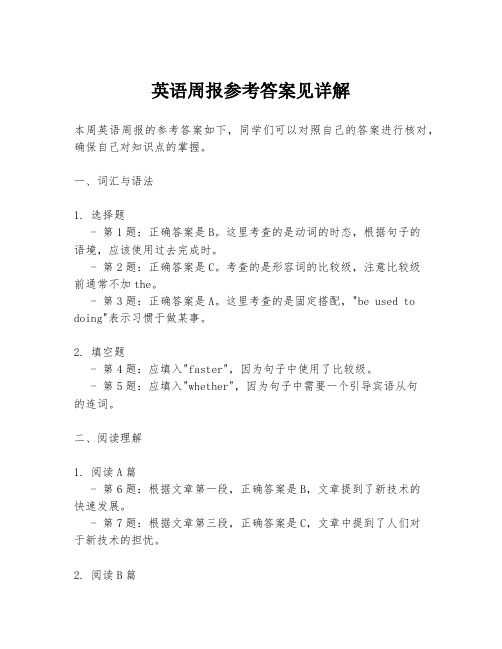
英语周报参考答案见详解本周英语周报的参考答案如下,同学们可以对照自己的答案进行核对,确保自己对知识点的掌握。
一、词汇与语法1. 选择题- 第1题:正确答案是B。
这里考查的是动词的时态,根据句子的语境,应该使用过去完成时。
- 第2题:正确答案是C。
考查的是形容词的比较级,注意比较级前通常不加the。
- 第3题:正确答案是A。
这里考查的是固定搭配,"be used to doing"表示习惯于做某事。
2. 填空题- 第4题:应填入"faster",因为句子中使用了比较级。
- 第5题:应填入"whether",因为句子中需要一个引导宾语从句的连词。
二、阅读理解1. 阅读A篇- 第6题:根据文章第一段,正确答案是B,文章提到了新技术的快速发展。
- 第7题:根据文章第三段,正确答案是C,文章中提到了人们对于新技术的担忧。
2. 阅读B篇- 第8题:正确答案是A,文章标题已经暗示了主题。
- 第9题:正确答案是D,根据文章最后一段的描述,可以推断出正确答案。
三、完形填空1. 第10题:正确答案是B,根据上下文,这里需要一个表示转折的连词。
2. 第11题:正确答案是A,这里考查的是固定短语"make a difference",表示产生影响。
3. 第12题:正确答案是C,根据句子结构,这里需要一个名词作主语。
四、翻译1. 第13题:正确翻译是"The company has been making a profitfor the past three years." 注意时态和短语的正确使用。
2. 第14题:正确翻译是"Despite the heavy rain, they still managed to reach the destination on time." 注意"despite"引导的让步状语从句的用法。
英语周报七年级新目标2022至2023学年答案
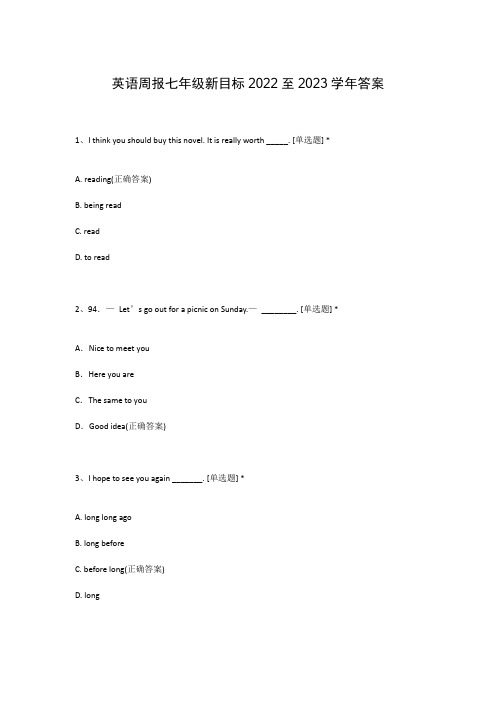
英语周报七年级新目标2022至2023学年答案1、I think you should buy this novel. It is really worth _____. [单选题] *A. reading(正确答案)B. being readC. readD. to read2、94.—Let’s go out for a picnic on Sunday.—________. [单选题] *A.Nice to meet youB.Here you areC.The same to youD.Good idea(正确答案)3、I hope to see you again _______. [单选题] *A. long long agoB. long beforeC. before long(正确答案)D. long4、Henry lives happily with his three cats. _______ of them are part of his family. [单选题] *A. NoneB. BothC. All(正确答案)D. Neither5、If the manager had to choose between the two, he would say John was _____ choice. [单选题] *A. goodB. the bestC. betterD. the better(正确答案)6、12.Who will ________ the Palace Museum after Shan Jixiang retires? [单选题] *A.in chargeB.in charge ofC.be in charge of (正确答案)D.be in the charge of7、-----How can I apply for an online course?------Just fill out this form and we _____ what we can do for you. [单选题] *A. seeB. are seeingC. have seenD. will see(正确答案)8、He _______ walks to school, because he lives near school. [单选题] *A. sometimes(正确答案)B. neverC. doesn’tD. don’t9、36.This kind of bread is terrible. I don't want to eat it ______. [单选题] * A.any more(正确答案)B.some moreC.no longerD.some longer10、Mary _______ Math. [单选题] *A. is good at(正确答案)B. do well inC. is good forD. is good with11、Tomorrow is Ann’s birthday. Her mother is going to make a _______ meal for her. [单选题] *A. commonB. quickC. special(正确答案)D. simple12、35.Everyone in China ______ Mid-Autumn Day. [单选题] *A.likes(正确答案)B.likeC.is likingD.are like13、Many children have to _______ their parents. [单选题] *A. divide intoB. put onC. depend on(正确答案)D. take on14、I’m sorry there are ______ apples in the fridge. You must go and buy some right now.()[单选题] *A. a littleB. littleC. a fewD. few(正确答案)15、_____ Lucy _____ Lily has joined the swimming club because they have no time. [单选题] *A. Not only; but alsoB. Neither; nor(正确答案)C. Either; orD. Both; and16、10.Mum, let me help you with your housework, so you ________ do it yourself. [单选题] *A.don’t need to(正确答案)B.need toC.don’t needD.need17、This species has nearly ()because its habitat is being destroyed. [单选题] *A. used upB. died out(正确答案)C. gone upD. got rid of18、20.Jerry is hard-working. It’s not ______ that he can pass the exam easily. [单选题] * A.surpriseB.surprising (正确答案)C.surprisedD.surprises19、He gathered his courage and went on writing music. [单选题] *A. 从事B. 靠······谋生C. 继续(正确答案)D. 致力于20、—These shoes look cool. ______ are they?—They are on sale, only $()[单选题] *A. How much(正确答案)B. How longC. How manyD. How soon21、My watch usually _______ good time, but today it is five minutes fast. [单选题] *A. goesB. makesC. keeps(正确答案)D. gains22、We are living in an age()many things are done by computer. [单选题] *A. thatB. whichC. whyD. when(正确答案)23、5.Shanghais is known ________ “the Oriental Pearl”, so many foreigners come to visit Shanghai very year. [单选题] *A.forB.as (正确答案)C.withD.about24、Something must be wrong with the girl’s _______. She can’t hear clearly. [单选题] *A. ears(正确答案)B. noseC. armsD. eyes25、88.Sorry. I don’t know the way? ? ? ? ? ?Dongfeng Cinema. [单选题] *A.byB.ofC.to(正确答案)D.for26、It is reported()three people were badly injured in the traffic accident. [单选题] *A. whichB. that(正确答案)C.whileD.what27、Boys and girls, _______ up your hands if you want to take part in the summer camp(夏令营).[单选题] *A. puttingB. to putC. put(正确答案)D. puts28、38.—Do you have ________else to say for your mistake?—________but sorry. [单选题] * A.anything; SomethingB.something; EverythingC.anything; Nothing(正确答案)D.something; Anything29、Catherine has two cousins. One is quiet, and _______ is noisy. [单选题] *A. anotherB. the other(正确答案)C. othersD. other30、Mr. Bliss became the first person to die in a car accident. [单选题] *A. 事故(正确答案)B. 竞赛C. 检阅D. 交易。
- 1、下载文档前请自行甄别文档内容的完整性,平台不提供额外的编辑、内容补充、找答案等附加服务。
- 2、"仅部分预览"的文档,不可在线预览部分如存在完整性等问题,可反馈申请退款(可完整预览的文档不适用该条件!)。
- 3、如文档侵犯您的权益,请联系客服反馈,我们会尽快为您处理(人工客服工作时间:9:00-18:30)。
《英语周报》七年级(GZ) 第10期Unit 3单元综合能力检测题答案解析一、语音与语法第一节语音1.答案C。
C项的画线部分发/ʊ/音,其他项的发/uː/音。
2.答案A。
A项的画线部分发/ʌ/音,其他项的发/ɑː/音3.答案D。
D项的画线部分发/uː/音,其他项的发/ʌ/音。
4.答案D。
D项的画线部分发/ɔː/音,其他项的发/ɒ/音。
5.答案D。
D项的画线部分发/ɒ/音,其他项的发/ɔː/音。
第二节单项选择6.答案C。
本题考查结构stop doing sth的用法。
stop doing sth,意为“停止做某事”。
stop后亦可接动词不定式构成结构stop to do sth,意为“停下来去做某事”。
7.答案A。
本题考查可数名词与不可数名词及其修饰词。
apple为可数名词,且在句中为单数形式,故排除D项。
bread为不可数名词,不可数名词不与基数词连用,故排除B 项。
不可数名词多用“不定冠词/基数词+量词+of”这一结构来表示数量。
three pieces of,意为“三块/条/件……”。
8.答案D。
本题考查quarter的用法。
quarter为可数名词,意为“四分之一;一刻钟”。
四分之一的英文表达为“one quarter”;四分之三的英文表达为“three quarters”。
9.答案B。
本题考查there be句型以及表示不可数名词数量的方式。
milk为不可数名词,无复数形式且不可与基数词连用,故排除A、D项。
在there be句型中,be动词的单复数形式由be之后接的主语的数而定。
在句中,be动词为复数形式,则表示be之后接的主语应为复数形式。
故排除C项。
“不定冠词/基数词+量词+of+名词”这类名词短语作主语时,句中谓语动词的形式不受其名词的形式影响,而是由其量词的单复数而定。
10.答案A。
本题考查结构ask sb not to do sth。
ask sb not to do sth,意为“叫某人不要做某事”。
第三节语法选择11.答案D。
该空考查特殊疑问词。
whose用于询问谁的;how用于询问方式或如何;why用于询问原因;where用于询问地点。
根据下一句,可推断出该空应选D项来提问垃圾的去处。
12.答案B。
该空考查动词。
该空所在句是对上一句的回答,由此可知该空的谓语动词应使用一般现在时;且句子主语为“Most of it”,其中“it”指代不可数名词“garbage”。
不可数名词作主语时,谓语动词应用其第三人称单数形式。
13.答案A。
该空考查there be句型。
在there be句型中,be动词的单复数形式由be之后接的主语的数而定。
“five large garbage patches”为名词短语的复数形式,故选A项。
14.答案D。
该空考查结构between ... and ...。
between ... and ...,意为“在……和……之间”。
15.答案A。
该空考查代词。
代词常紧接着出现在前文提及过的名词(短语)后,用以替代前文出现过的名词(短语),避免重复。
it它;its它的;it’s它是……。
16.答案B。
该空考查形容词比较级。
该空后的“than”,意为“比”,由此可知该空应填入形容词的比较级。
big的比较级为“bigger”,最高级为“biggest”。
17.答案C。
该空考查介词。
on Earth意为“在地球上”。
at后常接表示小地方的名词;in后常接表示大地方的名词;under意为“在……下面”。
18.答案A。
该空考查动词。
该空前的“can”为情态动词,情态动词后接动词原形。
19.答案C。
该空考查形容词。
形容词可位于名词前面修饰该名词。
differ为动词,意为“使……不同”;difference为名词,意为“差异”;differently为副词,意为“不同地”。
20.答案D。
该空考查动词不定式。
the most important thing is to do sth,意为“最重要的事是做某事”。
二、完形填空21.答案B。
根据下文的“People use it to help make maps.”,可知第一种人造卫星用于研究地球的地理,故选B项。
22.答案C。
根据上下文,可知第一种人造卫星用于研究地理,它亦可帮助国家找石油或黄金(富含石油或黄金的地理位置与地理有着密不可分的联系)。
23.答案A。
根据下文的“A ship or a plane can send ... where the ship or the plane is.”,可知第二种人造卫星用于给轮船和飞机指路。
24.答案C。
根据上下文,可知轮船或飞机可向这类型的人造卫星发送信息,然后它可以找到轮船或飞机的所在位置。
25.答案D。
根据下文的“... clouds and strong winds moving across the Earth.”以及“...weather is coming.”,可知第三种人造卫星用于研究天气。
故选D项。
26.答案B。
根据上下文,可知第三种人造卫星用于研究天气,人们用这些人造卫星来观测地球上的云以及强风。
27.答案A。
根据上文的“... help countries make preparations ...”,可知该空应选A项。
在恶劣天气来临时,人们常须提前做好应对措施。
28.答案A。
根据第一段,可知这篇文章将会介绍四种类型的人造卫星。
第二至第四段已介绍三种类型的人造卫星(还剩下最后一种人造卫星),由此可知该空应选A项。
29.答案B。
下文的“People from one country ... sends it to a station in another country.”是对上一句(这些人造卫星可在国家间传送电话呼叫)的进一步说明,由此可知该空应选B项。
30.答案D。
根据上下文,可知在一个国家的人向人造卫星发送呼叫后,人造卫星将此呼叫转送到另一个国家的通讯站。
故选D项。
三、阅读第一节阅读理解A【语篇解读】本文以第一人称介绍了Sara Green以及其家人的一些基本情况。
31.答案B。
细节理解题。
由第一段第五句可知Sara家除了Sara外,还有爸爸妈妈和姐姐Estelle。
故选B项。
32.答案C。
细节理解题。
由第一段倒数第三句可知Sara认为她爸爸的工作是有趣的。
故选C项。
33.答案A。
细节理解题。
由第二段第一句可知Sara所住的房子有一个前花园,即花园在房子的前面。
故选A项。
34.答案A。
细节理解题。
由第二段中的“But in my free time, reading is my favourite.”,可知在空闲时间,Sara最喜欢读书。
故选A项。
35.答案D。
细节理解题。
由第二段倒数最后一句,可知Sara喜欢待在那个图书馆里;由第一段第四句可知Sara的生日是在三月;由第一段倒数第二句可知Sara的妈妈是一名音乐家;由第二段第六句可知Sara想要成为一名生物学家。
B【语篇解读】本文主要介绍了Tyler的一个有意义的、难忘的周六。
36.答案C。
细节理解题。
由第二段第二句可知Tyler骑自行车去公园。
37.答案B。
细节理解题。
由第三段第二句可知Lauren和Tyler是同一个学校的,即他们是校友。
38.答案C。
细节理解题。
由第六段的倒数两句话以及第七段和第八段,可知Tyler在看到公园里有很多垃圾后,骑车回到了Lauren那里,想帮助清理公园里的垃圾。
39.答案A。
细节理解题。
由第十一段的最后两句,可知在Tyler离开公园时,他是疲惫但开心的。
40.答案B。
标题归纳题。
本文主要介绍了Tyler的一个有意义的、难忘的周六。
Tyler和往常一样去公园玩,一开始并不打算和Lauren他们一起清理公园里的垃圾,但在看到公园里有很多垃圾后,他决定和Lauren他们一起捡垃圾。
B项最能体现本文中心内容。
C【语篇解读】该材料为一则呼吁大家建设更美好的Bradford City的海报。
41.答案C。
细节理解题。
由“You can tell us about mice or rubbish by phoning our PublicHealth Unit at 01943 874 146.”可知该题选C项。
42.答案A。
细节理解题。
由下文的“You will get a £50 fine ...”,可知此部分的内容是对扔垃圾这一行为进行罚款处理,由此可知该题选A项。
43.答案D。
词义猜测题。
根据构词法可知该题选D项:want意为“希望;需要”,前缀un- 常表否定意义。
或根据上下文亦可猜测出该题选D项:为了制造更少的垃圾,我们可自带袋子去超市购物或使用以前的袋子,这样可减少不必要的袋子的使用。
44.答案C。
细节理解题。
由“Get your shopping bag from our Advice Centre. It is free.”,可知该题选C项。
45.答案D。
推理判断题。
该材料为一则呼吁大家建设更美好的Bradford City的海报。
我们可在报纸上看到此类公益海报。
附加题【语篇解读】本文主要介绍了一位来自美国的名人——Oprah Winfrey(奥普拉·温弗瑞)。
46.答案C。
标题归纳题。
第一段以及第二段介绍了Oprah不仅是一位聪明的、善于与人交流的主持人,同时也是一名演员,且拥有自己的个人杂志并热心公益事业。
talent 意为“才能;天资”。
47.答案A。
词义猜测题。
上文讲述了Oprah鼓励人们多读书、帮助他人、为更好的未来拼搏,由此可猜测出这些事在Oprah的眼中是重要的且有意义的。
48.答案D。
细节理解题。
由第三段第五句至最后,可知Oprah的父亲照顾她并让她按照他的规则来做事,最终Oprah变成优秀的学生并在高中时期得到了这样一份工作——在电台读新闻。
故选D项。
49.答案C。
细节理解题。
由第三段最后一句,可知Oprah在高中时期得到了这样一份工作——在电台读新闻。
故选C项。
50.答案D。
推理判断题。
本文主要介绍了一位来自美国的名人——Oprah Winfrey。
我们可在报纸的“人物”一栏看到此类内容。
第二节阅读填空51.答案B。
该空上文讲述了地球给了我们很多东西,由此可知该空应选B项(我们也给地球很多东西,但是其中的一些东西是不好的)。
52.答案A。
该空上文讲述了动物或植物可为其他动物或植物提供食物,由此可知该空应选A项(然而,动物无法从我们所丢弃的许多的东西中获得食物)。
53.答案E。
该空上文讲述了动植物不能吃金属、塑料或玻璃,由此可知该空应选E项(这些东西会在地下存留很多年)。
54.答案D。
该空上文讲述了如果我们将垃圾和化学品倒入水中,浮游生物将会死掉,由此可知该空应选D项(如果没有浮游生物,许多动物将会没有食物可吃)。
